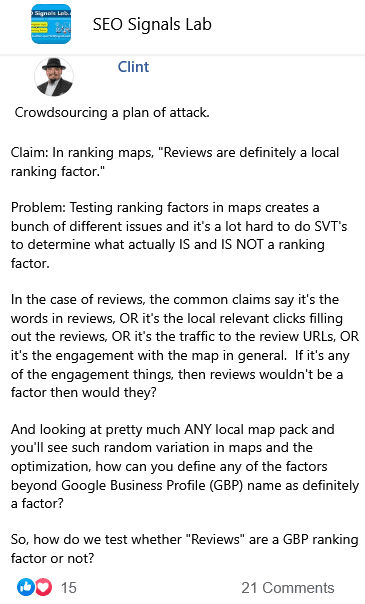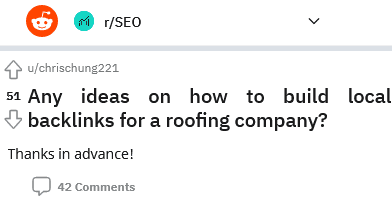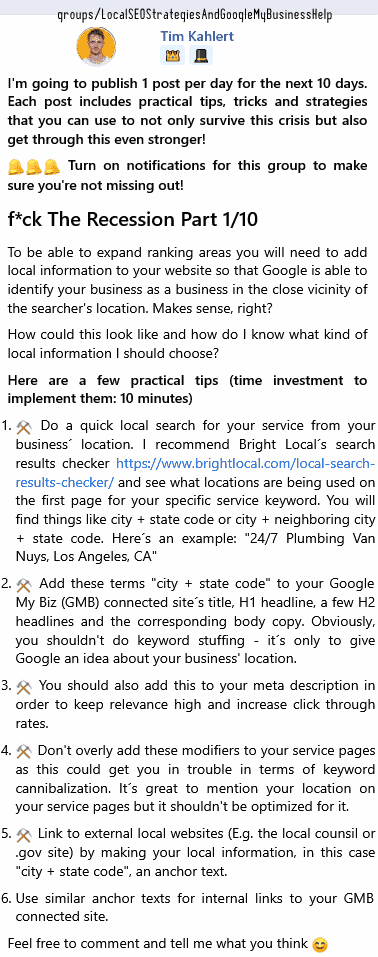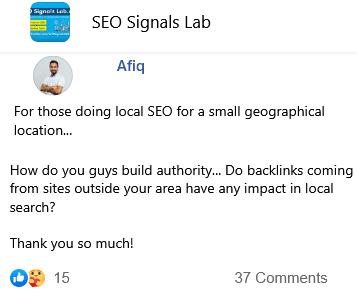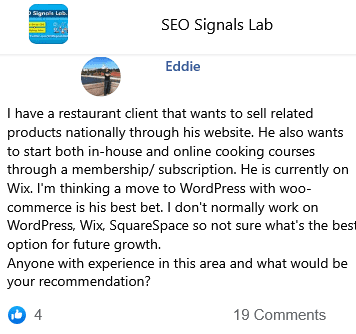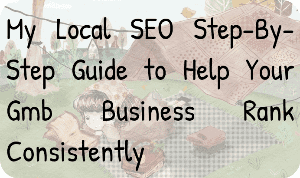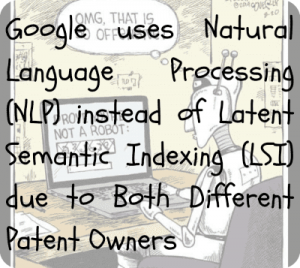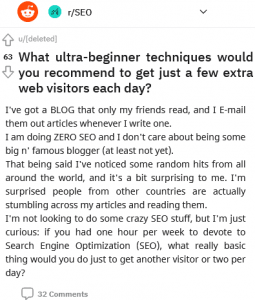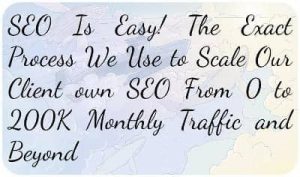Crowdsourcing a plan of attack.
Claim: In ranking maps, "Reviews are definitely a local ranking factor."
Problem: Testing ranking factors in maps creates a bunch of different issues and it's a lot hard to do SVT's to determine what actually IS and IS NOT a ranking factor.
In the case of reviews, the common claims say it's the words in reviews, OR it's the local relevant clicks filling out the reviews, OR it's the traffic to the review URLs, OR it's the engagement with the map in general. If it's any of the engagement things, then reviews wouldn't be a factor then would they?
And looking at pretty much ANY local map pack and you'll see such random variation in maps and the optimization, how can you define any of the factors beyond Google Business Profile (GBP) name as definitely a factor?
So, how do we test whether "Reviews" are a GBP ranking factor or not?
14 👍🏽1 💟15
21 💬🗨
📰👈
You could rank many campaigns using the same strategies in the same niche and apply different amounts of reviews across different test groups.
Take all the listings that aren't progressing as expected and check if it correlates to the quality of their reviews. Quality could range anywhere from five star w/ no text to five star w/ lots of relevant and "helpful" info.
You would have to exclude campaigns where certain negative things are present. Like possum filtered addresses, branding issues, history of suspension, etc.
Interesting, how would you eliminate interaction with the map listing as a factor?
Perez » Clint
You can't. You need to interact with the listing to place the review. If it is not ranked it does not get much interaction at all. This would be like the people that test Click Through Rate (CTR) manipulation to see if its just the interaction and not the actual placed review that made the increase happen.
Clint ✍️
so we're right back to the problem at hand, is it the interaction with the map to leave the review that's the factor OR is it the reviews that are the factor.
If you can't isolate interactions somehow, you can't say "reviews are definitely a ranking factor" for maps.
One idea is a modification of yours were each map gets the same number of reviews of various quality. The interactions would all be the same number, but the reviews and their types would be different.
Then, we could say more high-quality reviews would be a factor, but we still couldn't say "reviews are definitely a ranking factor" because we still have engagement with the map, which may be a higher factor trumping reviews.
Jesse Neubert 🎓
IDK if it is the 'interaction', or the reviews themselves, but we had a Google review service for a while and there was a period in time when the algo distinctly rewarded reviews (or the act of posting them). All reviews did include GEO and keyword info.
Prior to that it seemed to not matter that much at all.
SEO users caught on within 6 months, slammed maps with fake reviews in the tens of thousands, and within a quarter after that we saw the benefit drop back off to minimal/moderate vs high.
We ended up discontinuing our review service based on the ethics of fake reviews. The integrity of my writing team wasn't worth the few dollars per post SEO users were willing to pay.
Ammon Johns 🎓
First, make notes on all the potential signals and variables you can to eliminate or neutralize. For example, running the test on a service business (rather than a store or business with an interactive location will eliminate the 'footfall' parts of the variables), and you won't have to worry about only testing with businesses that get the exact same number of android-carrying visitors as much. Additionally, while Google could limit the counting of reviews to only those verified to have visited a premises in their timeline, they can't really do the same for a service business that comes to the customer.
You'll need to find service businesses that have a similar ranking where they also have essentially the same distance, to negate the proximity signal as far as possible. You'll likely want to run several examples just like this concurrently, the duplicates to allow a sample size and negate pure coincidence, and the concurrency to negate temporal ranking factors.
You'll want to carefully restrict who's involved in the testing, such that they are not continually all checking the results as the experiment runs, creating unusual search behaviours that may influence the outcome. Only use people you trust absolutely not to accidentally screw up the whole thing by accident.
You'll need to first study the volatility of the exact Search Engine Result Page (SERP), and get a good idea of the natural levels of fluctuation so that you can benchmark what would be 'significant deviation' for that SERP over normal fluctuation levels.
You'll still have to figure out ways to account in the proximity differences between participants and the businesses involved in the testing, although only counting the measure from specific points accounts might work.
The one thing that is absolutely certain is that it is not going to be easy, and it will involve a huge investment of both time and effort to do correctly. However, the payoff for doing it right is generally commensurate with the amount of investment it takes, and thus the scarcity of such results.
Egstrom
Official statement from Googles support page.
"High-quality, positive reviews from your customers will improve your business's visibility."
Reference: https://support.google.com/business/answer/7091?hl=en
At the end of last year, Darren Shaw of Whitespark released the findings from his annual Google Local Rankings Survey.
The results of the survey found that reviews accounted for 15.44% of how Google ranks a local business.
You've got 3 options,
1.) Read through the documentation they have made publicly available.
2.) Look to a trusted and certified Google partner.
3.) Join a FB group and hope that someone has outsmarted the thousands of engineers up in Mountain View and just randomly has nothing better to do than offer free advice within the comments section…SUPPORT.GOOGLE.COM
How to improve your local ranking on Google – Google Business Profile Help
📰👈
Google-Confirmed Local Ranking Factors: Keyword match, Backlinks, HQ Reviews
Somethings Not to Do to Optimize a Google My Business (GMB) or Business Profile (GBP)
Backlink Effect for Local SEO
A GMB Map Ranking Strategy that Works!
Does having a Google Website help with GMB SEO?
Strategies, so Our Customers Leave a Review on Our Google My Business (GMB)
My Client is Ranking 1 in a Three-Pack, but he is getting no Leads may because his Phone Number doesn’t Appear on it
Having 2 Local SEO Clients in the Same Business model Same City. It is Cool!
